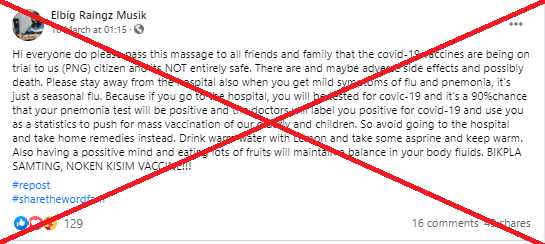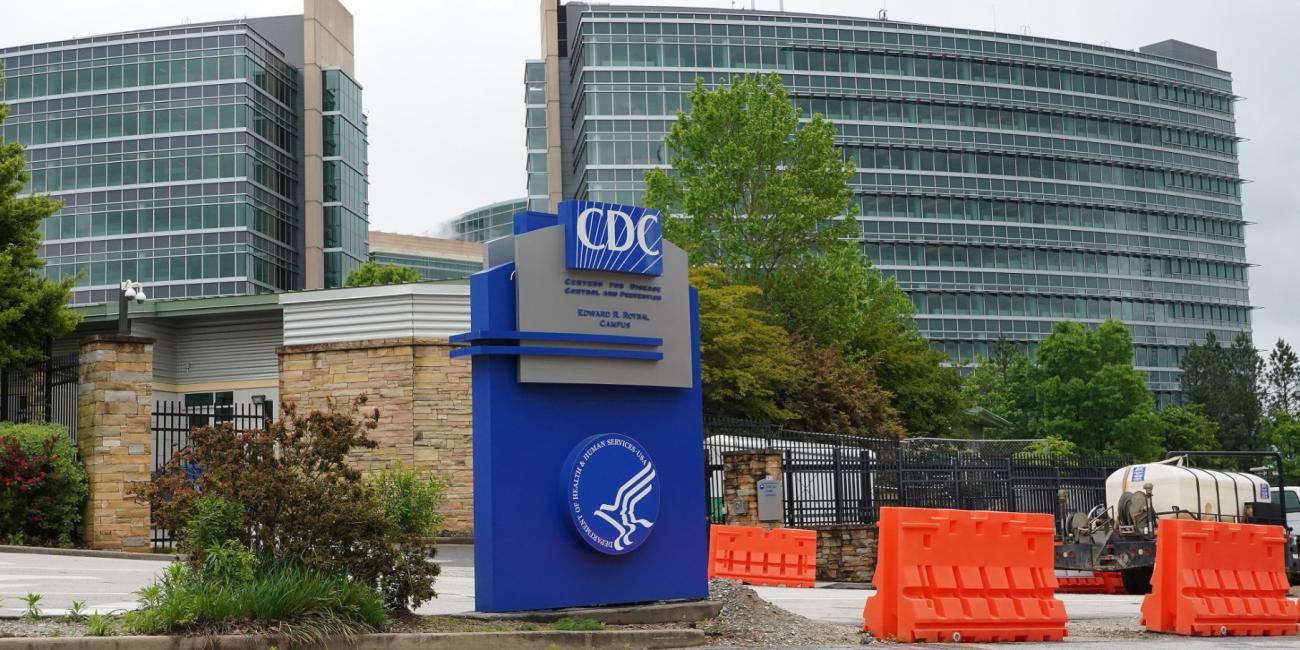
Papua New Guinea post shares Covid-19 vaccine misinformation
- This article is more than four years old.
- Published on March 23, 2021 at 10:48
- Updated on April 27, 2021 at 16:24
- 3 min read
- By Taylor THOMPSON-FULLER, AFP New Zealand and Pacific Islands
The claim was posted on Facebook here on March 15, 2021.

A screenshot of the misleading post, taken March 22, 2021.
The post claims Covid-19 vaccines “are NOT entirely safe” and are being trialled on local residents. “There are and maybe adverse side effects and possibly death,” it adds.
The post advises people to stay away from the hospital if they develop Covid-19 symptoms. “The doctors will label you positive for covid-19 and use you as a statistics to push for mass vaccination of our olderly and children (sic),” it claims.
The post also recommends people take home remedies instead of going to hospital: “Drink warm water with Lemon and take some asprine [sic] and keep warm. Also having a possitive [sic] mind and eating lots of fruits will maintain a balance in your body fluids.”
Papua New Guinea has experienced an unprecedented surge in Covid-19 infections, prompting fears the virus could be spreading undetected.
The claims were also reposted by other Papua New Guinea-based Facebook users here, here and here.
The claims, however, are false.
Vaccines widely tested
While vaccinations in Papua New Guinea haven’t begun as of March 19, 2021, Australia has donated 8,000 AstraZeneca vaccines to the country in response to the worsening Covid-19 outbreak.
The Therapeutic Goods Administration (TGA), Australia's medical regulatory body, gave provisional authorization to AstraZeneca’s vaccine in February 2021. “Australians can be confident that the TGA's review process of this vaccine was rigorous and of the highest standard,” the agency stated.
The AstraZeneca vaccine does have documented side effects that can present after inoculation. The side effects, however, are normally mild to moderate and resolve within a few days, according to this TGA. factsheet.
“Safety data collected on the COVID-19 vaccines used in Australia is consistent with the known side effects. No new safety concerns have been identified,” the agency adds here.
As of March 17, 2021, over 200,000 Covid-19 vaccinations had been administered in Australia, with a further 400 million doses administered worldwide, according to this set of Our World in Data statistics.
The US Centers for Disease Control and Prevention (CDC), which monitors deaths reported after vaccinations, has also “not detected patterns in cause of death that would indicate a safety problem with Covid-19 vaccines”.
“A review of available clinical information including death certificates, autopsy, and medical records revealed no evidence that vaccination contributed to patient deaths,” the CDC website states here.
Experts urge testing
Matt Cannon, the CEO of St Johns Ambulance in Papua New Guinea, told AFP that those experiencing flu-like symptoms or trouble breathing should get tested for Covid-19 and go to hospital.
“Let the Health Centre staff know that you have symptoms of COVID-19, or you tell them your symptoms and then they can take appropriate measures to protect themselves,” Cannon said in the March 18 interview.
He also stated that the Facebook post’s assertion that Papua New Guinea’s Covid-19 outbreak is just the flu or common cold is “not only dangerous but simply wrong.”
Cannon warned that the outbreak could worsen if people don't get tested.
“We are seeing evidence of people either highly likely to have Covid, or being confirmed cases, and continuing business as usual -- that will likely be contributing to the spread of Covid-19 in Papua New Guinea,” he said.
Home remedies
Cannon also refuted the Facebook post’s false claim about only adhering to at-home remedies.
Treatment for mild Covid-19 cases, he explained, can include paracetamol, staying hydrated and eating healthy. He added, however, that none of those remedies will cure the disease and likened the approach to taking morphine to “make your broken leg get better.”
The Queensland Department of Health, which is assisting Papua New Guinea with Covid-19 testing, also recommends people with Covid-19 only take medications if they have been prescribed by a doctor.
“If you are recovering with the virus at home, it’s important to get plenty of rest, drink fluids, and eat well when it’s comfortable to do so,” the Queensland Health website reads. “It’s important to only take medicines your doctor has recommended, because they will understand how these might interact with any other medicines you take and your health history.”
CORRECTION: This article was updated on 30/3/21 to correct a reference to the Oxford/AstraZeneca vaccine, which was wrongly described as an mRNA vaccine. The Oxford/AstraZeneca vaccine uses a viral vector, not mRNA technology.
Copyright © AFP 2017-2026. Any commercial use of this content requires a subscription. Click here to find out more.
Is there content that you would like AFP to fact-check? Get in touch.
Contact us




